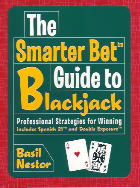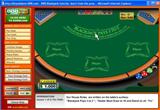ReadyBetGo's Guide to Blackjack Etiquette
Tokes - Tipping at BlackjackBlackjack Etiquette Basics
Blackjack Superstitions and Customs
Smarter Bet Guide to Blackjack
by Basil Nestor
Strategy is the key to success at the blackjack table; that's a mathematical fact, and you can count on these expert, easy-to-learn tactics to make you a victor. Here's the deal: everything begins with the basic rules, and they're laid out on these pages with smart little “factoid” tips. Go through blackjack economics, which explain why cards fall the way they do, and what makes a good (and a sucker) bet. Easy-to-follow tables suggest strategies for splitting pairs and soft hands and provide dozens of other statistics and card probabilities.
Free Online Blackjack School!
LuckyAce casino offers an excellent online tutorial for learning blackjack. This interactive instruction introduces beginners to the table, rules, cards and chips. There are also practice lessons, an explanation of house rules and a glossary. A particularly useful feature is the basic strategy card which you can consult while you play. If you're learning blackjack basic strategy, check out this blackjack school!
Blackjack Etiquette Basics
by Basil Nestor
Blackjack is like any organized activity; it works best when everyone follows the rules. A well-played blackjack game has a pleasant rhythm; there’s no confusion about who gets what or who has Basil Nestor is the author of the new Playboy Complete Guide to Casino Gambling. This wonderful book teaches players how to avoid sucker bets and win more when playing gambling games. He is also the author of The Smarter Bet Guide series for video poker, slots, craps, and many other books about gambling. Basil's website is www.smarterbet.com won. But players who lose the rhythm or break the rules can turn the whole thing into lumbering chaos.
Basil Nestor is the author of the new Playboy Complete Guide to Casino Gambling. This wonderful book teaches players how to avoid sucker bets and win more when playing gambling games. He is also the author of The Smarter Bet Guide series for video poker, slots, craps, and many other books about gambling. Basil's website is www.smarterbet.com won. But players who lose the rhythm or break the rules can turn the whole thing into lumbering chaos.
 Basil Nestor is the author of the new Playboy Complete Guide to Casino Gambling. This wonderful book teaches players how to avoid sucker bets and win more when playing gambling games. He is also the author of The Smarter Bet Guide series for video poker, slots, craps, and many other books about gambling. Basil's website is www.smarterbet.com won. But players who lose the rhythm or break the rules can turn the whole thing into lumbering chaos.
Basil Nestor is the author of the new Playboy Complete Guide to Casino Gambling. This wonderful book teaches players how to avoid sucker bets and win more when playing gambling games. He is also the author of The Smarter Bet Guide series for video poker, slots, craps, and many other books about gambling. Basil's website is www.smarterbet.com won. But players who lose the rhythm or break the rules can turn the whole thing into lumbering chaos. Miscommunication can cause hands to be improperly hit (or not hit). Mishandling of chips or cards can delay the game and create confusion about payoffs or the results of a hand. And in some instances a mistake can cause other players at the table to lose their bets. This misfortune is not anyone’s fault from a strictly statistical point of view (every player competes independently with the dealer), but from a practical point of view it is easy to blame the guy at third base who incorrectly took the dealer’s bust card.
Thou Shalt Not
Every game has some strict rules, like pass interference or roughing the kicker in football. These standards are sometimes inconvenient, but they’re necessary or the game cannot be safely played. The following rules involve casino security, game integrity, or financial transactions. Bending or violating these standards will bring a warning from a dealer. Repeated violations (in extreme situations) may cause a player to be barred from the game or ejected from the casino.
Money transactions must be observable.
Never hand money directly to a dealer. Instead, you should put it flat on the felt. A dealer will count the bills so that cameras above the table can see the transaction, then she’ll exchange the cash for chips.
When you decide to leave the table (hopefully with more chips than at the buy-in), you can ask the dealer for a color up. She will exchange your lower-denomination chips for fewer chips with a higher value. You can exchange chips for cash at the cage (the bank-like area of the casino where money transactions are conducted), or you can take them to another table and buy in there.
By the way, these procedure for handling chips and cash are standard for all table games.
Cards must be handled correctly.
A hand that is dealt face-up should not be touched. A hand that is dealt face-down should never be removed from the table or placed out of view at any time. Cards should not be scratched, bent, or marked in any way.
Chips in the circle must not be touched during play.
Scammers sometimes try to add or remove chips after seeing their hand (adding chips is called past-posting). Casinos prevent this by prohibiting players from touching their bets after a hand begins. Also remember that this rule affects doubles and splits. You should never stack the extra bet on top of the chips already in the circle. Instead, place the extra chips next to the original bet.
Hand signals must be clear and observable.
Verbal instructions don’t count. You must clearly tap the table or scratch your cards for a hit, and lift up one hand (as if to say “stop”) or push the cards under the bet for a stand. For example, let’s say you’re in a splitting situation, and you’re trying to remember the strategy. Don’t tap the table while thinking or you may receive a hit.
Mechanical assistance is forbidden.
Assistance from a computer or other mechanical device is prohibited by law when playing blackjack in a casino. The exact prohibitions vary in various states and provinces, but if you hear about someone playing blackjack with a computer in his shoe, there’s no doubt he’s breaking the law. On the other hand, there is no law prohibiting a mental process or strategy that can be implemented without mechanical assistance.
“It is unlawful for any person at a licensed gaming establishment to use, or possess with the intent to use, any device to assist: 1. In projecting the outcome of the game; 2. In keeping track of the cards played; 3. In analyzing the probability of the occurrence of an event relating to the game…” Nevada statute 465.075
The preceding material is just a sample of what you'll find in Basil Nestor's Smarter Bet Guide to Blackjack.
[ learn more blackjack! ]

